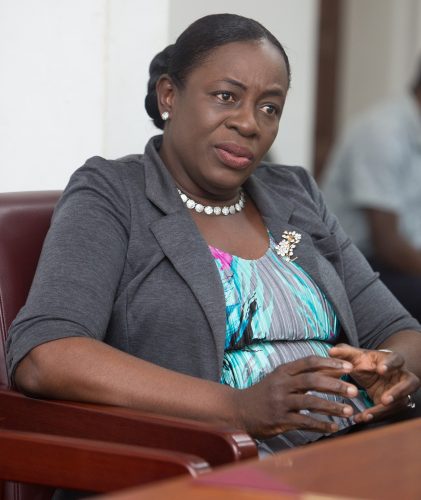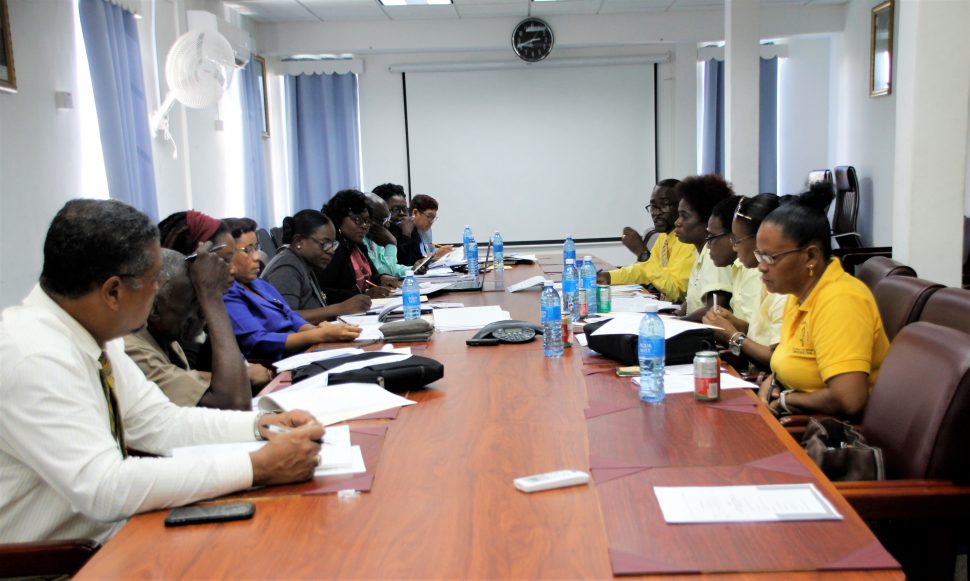A meeting between the Ministry of Education and the Guyana Teachers’ Union (GTU) yesterday failed to yield progress for an agreement on proposed wage increases for teachers, setting the stage for a planned strike to proceed.
“We are coming out very dissatisfied with this engagement for the simple reason that our salary issues were a major concern here. Increases in salaries and other financial benefits, they have all been pushed down. The union’s position is that our position will remain the same,” GTU President Mark Lyte said after the two-and-three-quarter-hour-long engagement yesterday afternoon.

“We believe that our increases in terms of finances was extremely important to the cause of our teachers. Our concern is that our teachers cannot survive on the salaries they are receiving,” he added.
Lyte spoke with teachers who were outside the ministry awaiting the outcome of meeting, which was held at the office of Education Minister Nicolette Henry at Lot 26 Brickdam.
Asked if the union will continue meeting with the ministry to resolve the issues, Lyte said, “We don’t believe that we should go to another meeting to hear the same thing.”

It was incumbent on the minister with responsibility for labour to put in place an arbitrator to deliberate on the matter, he said. “In the interim, the union has to go forward with its plan. Our teachers must send a strong signal,” he added, while referencing the strike action scheduled to begin on August 27th.
The GTU will write the ministry formally on its position, which Lyte said will be guided by legal advice.
On the other hand, Henry told the media in the ministry’s boardroom that the meeting was “very productive” from the perspective of the ministry and the government.
“We sat for over two hours and we were able to discuss and get further agreement to further issues that we were not able to agree on at our prior meeting. That in a large way represents progress,” she said.
Coming out of the meeting, Henry said, “We have determined that most of the non-financial issues were settled to a large extent. Therefore, the more heavy lifting ones, particularly the issues relating to salary increases and de-bunching, are still to be resolved.”
The increase for salaries remained a lump sum of $700 million and the $200 million de-bunching offer remained the same, both of which the union again rejected.
Asked about the union’s position that it was not prepared to meet with the ministry again and that the next step would be arbitration. Henry said, “The next step would be conciliation if we are unable to continue negotiations.”
Circumstances
Had the circumstances dictated otherwise, Henry said the government “would have been happy to honour in full the agreement but we do not have the resources and fiscal space at this time to honour what they are asking for.”
When this government took office, she said, “there were some things that happened unexpectedly that we did not anticipate and that had huge financial implications in so far as we had to spend money on things that you may not have catered for while you are campaigning on the outside. So your situation will change and that will dictate and determine what next will happen.”
Teachers may want a 40 per cent, she said, “but it does not happen that way.”
Henry added that she indicated that she intends to get back to the GTU within 72 hours to sign off on the minutes in which they would have agreed or had partial agreements in principle.
In relation to strike action, Henry said, the ministry has internal standard operations procedures (SOPs) in the event that there is unrest or industrial action.
“I have asked the Chief Education Officer to ensure that we have all the preliminary work done in the event that we have to activate. We are not thinking that we have to but we have to always be prepared,” she explained.
In the meantime, she said, “We will work within the predetermined framework and they do allow for us to continue to have fruitful discussions, negotiations as we have seen this afternoon. Two days ago, to many people, they doubted we would have this meeting. And to have one conducted in such an atmosphere of civility and respect for both parties represents maturity on both sides,” she added.
Based on the extent of the strike, the SOPs allow for certain determinations such as whether to hire temporary teachers or whether to close schools.
Meanwhile, on the other issues, Lyte said the union objected to the fact that the ministry was not prepared to offer increased incentives for improved qualifications. The ministry did not agree to pay an $8,000 clothing allowance and to grant Whitley Council leave after three years. The hard lying allowance remains the same.
The union vented its concerns about school boards, Lyte said, but the ministry was adamant that it wanted to maintain school boards with improved staff. “We indicated that we are not in favour of that because school boards and the Teaching Service Commission are operating at a different level and there are a lot of problems happening at those levels,” he noted.
Meanwhile, Lyte said the ministry agreed to paying special education needs teachers improved salaries, and to hire specialists for schools that have dormitories to relieve the burdens from head teachers where there are dorms.
The ministry has also agreed to give hinterland teachers who live in the hinterland but work away from their home base a return fare to their homes once a term.
On the setting up of the Teachers House Revolving Fund, Lyte said, they agreed that the committee to manage the fund will comprise a representative of the Ministry of Communities, two from the Ministry of Education and two from the GTU.





